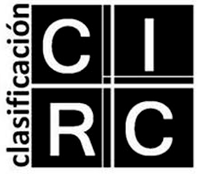
Declaração ética sobre a publicação e as boas práticas
A RiHC. Revista Internacional de Historia de la Comunicación declara o seu compromisso com os padrões éticos de publicação que sustentam o desenvolvimento correto da investigação e de suas instituições. Esse compromisso ético deve ser assumido por todas as partes envolvidas no processo de publicação da revista, desde a gestão até os autores e avaliadores.
Os critérios para a avaliação positiva dos artigos submetidos serão exclusivamente a originalidade, a relevância e a clareza da contribuição, bem como sua adequação à linha editorial da revista. Não será exigido dos autores qualquer título acadêmico específico para a publicação de seus trabalhos (não é necessário possuir título de doutor para publicar na revista).
Todo o processo de avaliação e revisão será anónimo. Os autores devem preparar o arquivo original de forma a garantir seu anonimato (conforme detalhado nas Diretrizes para autores). Os avaliadores não devem aceitar realizar a avaliação caso consigam identificar, pelo conteúdo do artigo, a autoria individual ou coletiva. O Conselho Editorial considerará, dentro de suas possibilidades, possíveis vínculos com os autores ao designar os avaliadores. Da mesma forma, será mantida a confidencialidade e o anonimato de todas as informações derivadas do processo de avaliação, bem como de quaisquer esclarecimentos ou reclamações que possam surgir.
A RiHC condena o plágio e procederá à eliminação ou à não publicação dos trabalhos que evidenciem essa prática. O autor deve garantir que o trabalho submetido é original e que não infringe os direitos autorais de terceiros. Da mesma forma, os avaliadores devem informar ao Conselho Editorial qualquer suspeita de plágio encontrada nos manuscritos que lhes forem encaminhados.
No caso de autoria compartilhada, todos os autores devem declarar que o conteúdo do artigo proposto foi acordado entre eles. Os artigos submetidos não podem ter sido apresentados ou publicados em nenhum outro meio de comunicação.
Os autores são responsáveis pela veracidade dos dados obtidos ou citados, os quais não podem ser distorcidos ou falsificados com o intuito de confirmar a hipótese inicial. Devem também consultar os materiais mais atualizados e pertinentes ao tema abordado no artigo. É necessário incluir como autores todas as pessoas que participaram de forma relevante no desenho conceitual e planeamento do trabalho, na interpretação dos resultados e na redação da pesquisa. A ordem dos autores deve refletir o grau de participação de cada um. O conteúdo de cada artigo é da responsabilidade exclusiva dos autores.
Os avaliadores deverão avaliar os artigos de forma crítica e honesta. Devem informar o Conselho Editorial da sua recusa em avaliar o artigo caso considerem não possuir qualificação adequada para a tarefa ou identifiquem conflito de interesse com algum dos autores ou elementos do trabalho. Os avaliadores preencherão um relatório detalhado no qual explicarão a sua avaliação e fundamentarão sua decisão, especialmente em caso de rejeição do artigo. Para isso, a RiHC fornecerá um modelo com os principais pontos a serem abordados na revisão, com a possibilidade de acrescentar comentários adicionais ao final.
De forma anónima, os autores serão informados da decisão da avaliação e receberão o relatório elaborado pelos diferentes avaliadores. Caso os avaliadores considerem que o artigo é publicável após revisões, os autores deverão realizar as alterações antes da publicação final. Após o recebimento do artigo modificado, a decisão final sobre a publicação caberá ao Conselho Editorial, com base no grau de atendimento às observações feitas pelos avaliadores.
Se os autores identificarem algum erro no artigo já publicado, deverão comunicá-lo aos editores para que as correções sejam feitas e publicadas, parcial ou integralmente, nos termos adequados e conforme os padrões editoriais da revista.
Além dos pontos acima, a RiHC adota como referência o Código de Ética e Boas Práticas estabelecido pelo Committee on Publication Ethics (COPE) para editores de revistas científicas. Em caso de conflitos de interesse, seguir-se-ão os fluxogramas do COPE. (https://publicationethics.org/core-practices).

A RIHC assinou a Declaração de São Francisco sobre a Avaliação da Pesquisa.
RIHC has signed San Francisco Declaration on Research Assessment












